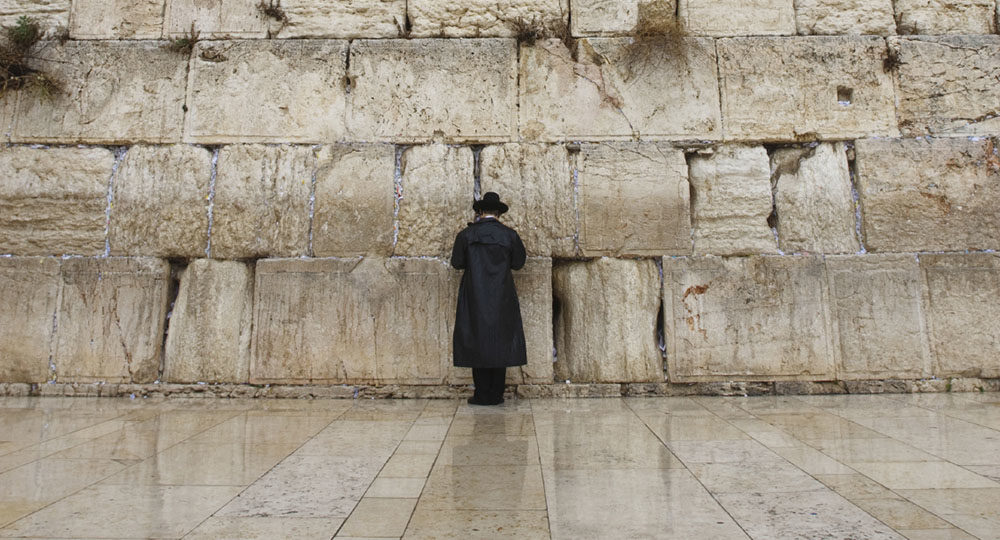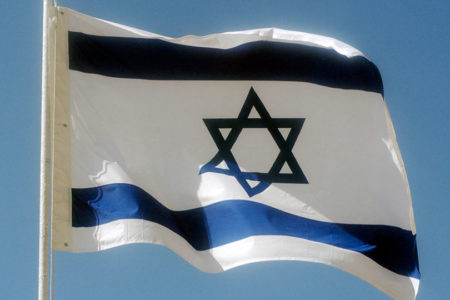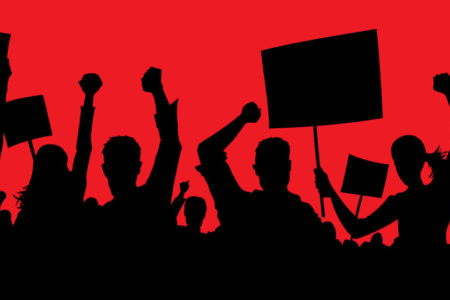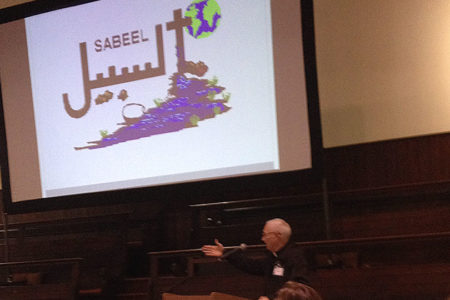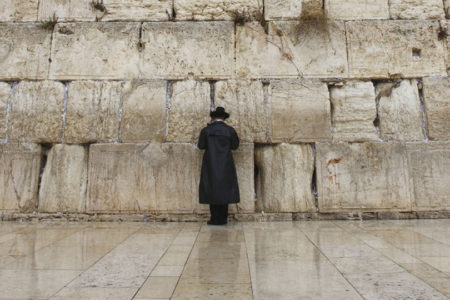Pushing the Anti-Israel Agenda
The “empire” is dying, according to Phyllis Bennis. When Bennis says “empire,” she is not referring to the massive Roman Empire that once ruled Europe and the Middle East or even the British Empire that once controlled 20 percent of the world’s population. She is referring to what she calls the “American Empire,” which she says is declining as it tries to recover from its wars of aggression in Iraq and Afghanistan.
As for Israel, it is merely the “cat’s paw” of American imperialism; and Christians who support the Jewish state foolishly believe in a theology that encourages Israel’s colonial aspirations.
Phyllis Bennis works for the Institute for Policy Studies in Washington, DC, and has written numerous books condemning Israel and the role of U.S. foreign policy concerning Israel.
In March she was a guest speaker at the Friends of Sabeel–North America (FOSNA) conference in Philadelphia, where she encouraged people to strive to turn U.S. foreign policy against the Jewish state. Bennis is Jewish.
FOSNA is part of the support system for Sabeel, an ecumenical center in Jerusalem for Palestinian-Liberation Theology. Sabeel claims to work for justice and peace in “Palestine-Israel.”
But from what I experienced, the conference felt more like an anti-Israel rally than anything else.
Multiple speakers, including Bennis, coached people on America’s so-called negative role in international affairs and its strategic ties to Israel. Each session boiled down to three simple points: (1) Israel is an apartheid nation, (2) Zionism is racism, and (3) the State of Israel is illegitimate.
FOSNA is working tirelessly to advance this message in America and attract support among Christians. Speakers threw the word apartheid around like a baseball in almost every lecture, trying to equate Israel with South Africa prior to Nelson Mandela’s presidency in 1994.
Bennis and company believe Israel built its roughly 400 miles of security fence as a political move to stake out its territory in the event of a future Palestinian state. They say the “wall,” as they call it, is an outworking of Israel’s desire to “ethnically cleanse” Palestinians from the land through eventual forced expulsion.
The Israeli Apartheid movement and Boycott, Divestment and Sanctions movement (BDS) are advancing around the world, heavily funded by pro-Palestinian forces trying to crush Israel economically and demonizing it as a colonialist power that stole Arab land and oppresses weak and helpless Palestinians.
Their primary targets are impressionable college students. These movements have a wealth of materials and lecturers to propagate their agenda and are building BDS networks that call for boycotting all Israeli products, not merely goods produced in the West Bank.
For two days I listened to speaker after speaker repeat the same message, throwing the word apartheid around for effect. The conference even had a gallery of boycott-apartheid artwork to walk through for inspiration. Yet not once did anyone mention the Palestinian terrorist activities that forced Israel to build the fence in the first place.
Between 2000 and 2003, more than 290 Israeli civilians were killed by Palestinian terrorists and 1,950 were wounded. Snipers were killing even infants in strollers and children in moving vehicles. Israel built the fence to protect its people and prevent Arabs from entering the country for the sole purpose of committing acts of terror.
Every government has a responsibility to protect its citizens. Statistically, the fence has been an overwhelming success. Since its construction, terrorism in Israeli cities has declined more than 90 percent.1 Even terrorists say the fence has been effective. In 2006, Ramadan Shalah, leader of the Palestinian Islamic Jihad, admitted on Hezbollah’s Al-Manar TV, “There is a separation fence which is an obstacle to resistance [terrorism], and if it were not there, the situation would be entirely different.”2 In other words, without the fence, Islamic Jihad would have been able to kill more Israelis.
No one disagrees that life is more difficult for Palestinians and Israelis with the fence in place. But who is to blame? If there were no terrorism, there would be no need for excessive security. Protecting human life should trump the hassles of getting through a checkpoint.
FOSNA did not have a lecture called “Zionism Is Racism.” However, the sentiment was there. During one of Bennis’s lectures, someone asked, “Is Zionism racism?” Bennis’s reply was multifaceted. She believes:
- The Israel Defense Forces (IDF) builds racism into its training with the goal of dehumanizing Palestinians.
- Reciting chants like “Zionism is racism, Zionism is terrorism” is not an effective way to educate others about Zionism because it is offensive and turns people off.
- Zionism is rooted in racism because (as she sees it) it emphasizes Jewish elitism over the Palestinians.
Not once did Bennis or anyone else mention that there are more than 50 Muslim nations in the world that are hostile to Jews and Christians. Many persecute Christians. Not one of these nations was called racist. Nor did anyone point out that Palestinian Authority (PA) President Mahmoud Abbas has vowed to keep Jews out of a future Palestinian state. Yet the PA was not called racist.
Israel, on the other hand, grants full citizenship, including the right to vote and hold elective office, to more than 1 million Arabs. But Israel is called racist.
Theodor Herzl, the father of modern Zionism, wrote in his 1902 novel Altneuland (The Old New Land), “It would be immoral if we would exclude anyone, whatever his origin, his descent, or his religion, from participating in our achievements.”
Herzl’s profound statement of inclusion has become the true slogan of Zionism, not racism. Furthermore, when Israel was established in 1948, its Declaration of Independence proclaimed,
THE STATE OF ISRAEL…will ensure complete equality of social and political rights to all its inhabitants irrespective of religion, race or sex; it will guarantee freedom of religion, conscience, language, education and culture; it will safeguard the Holy Places of all religions; and it will be faithful to the principles of the Charter of the United Nations.3
Israel’s citizenry is comprised of Jewish people, Arabs, Christians, Druze, and more. Israel accepts each ethnicity’s religion and grants equal rights, freedoms, and opportunities to worship. Every Israeli citizen—regardless of race or creed—has the right to vote and receives an Israeli education, Israeli national health care, and a pension on retiring.
In a Friends of Israel blog, I noted that most Israelis want the Palestinians to have a state of their own and a bright, peaceful future. Israelis are tired of war. But Israel’s neighbors have vowed to fight until they destroy the Jewish state.
For more than 65 years, Israel has required the Arab nations to recognize its right to exist in order to negotiate a final and lasting peace. So far, Israel’s demand has fallen on deaf ears, and its requirement of recognition became a running joke at the FOSNA conference. Participants mocked it, believing Israel is clawing for any reason not to make peace. The Arab refusal to recognize Israel is another way for the PA to say the Jewish state is illegitimate.
When I questioned the speakers about their vision for the future of the State of Israel, they spoke of a Palestinian “right of return,” by which all Palestinians who have refugee status around the world would move to Israel.
“Would the State of Israel remain a Jewish state, and would it still be called Israel, with your desire for the right of return?” I asked.
Each speaker looked at me, shrugged, and replied, “That’s not for me to decide.” The answer was another way of saying, “I don’t care.” These people do not care about Israel’s future because they do not accept its legitimacy.
As World War I was winding down, the British seized control of Palestine from the Ottoman Turks. When they assumed administration over the area, Lord Arthur James Balfour wrote a letter to Baron Edmond de Rothschild in 1917, saying the British government favored “the establishment in Palestine of a national home for the Jewish people.”
The principles of the Balfour Declaration were incorporated into the San Remo Conference of 1920, which established all of Palestine as a Jewish national homeland via international law according to the League of Nations.
Though critics shrug their shoulders at Israel’s legitimacy, they have international law to reckon with when they chuckle at Israel’s demand for recognition. Unfortunately, the Arabs are rewriting history and claiming America and evangelical Christians are helping Israel “oppress” the Palestinians. Worse yet, these revisionists are knocking on the doors of U.S. churches and gaining entry. Christians must arm themselves with truth, or they will be pulled into the vortex of those who want to do away with the State of Israel.
ENDNOTES
- Mitchell Bard, “West Bank Security Fence: Background & Over-view,” Jewish Virtual Library, July 2005 <jewishvirtuallibrary.org/jsource/Peace/fence.html>.
- “The leader of the Palestinian Islamic Jihad again admits that the Israeli security fence built by Israel in Judea and Samaria prevents the terrorist organizations from reaching the heart of Israel to carry out suicide bombing attacks,” The Meir Amit Intelligence and Terrorism Information Center at the Israel Intelligence Heritage and Commemoration Center (IICC), March 27, 2008 <terrorism-info.org.il/en/article/18486>.
- “The Declaration of the Establishment of the State of Israel,” Israel Ministry of Foreign Affairs, May 14, 1948 <tinyurl.com/IsraelDec>.
